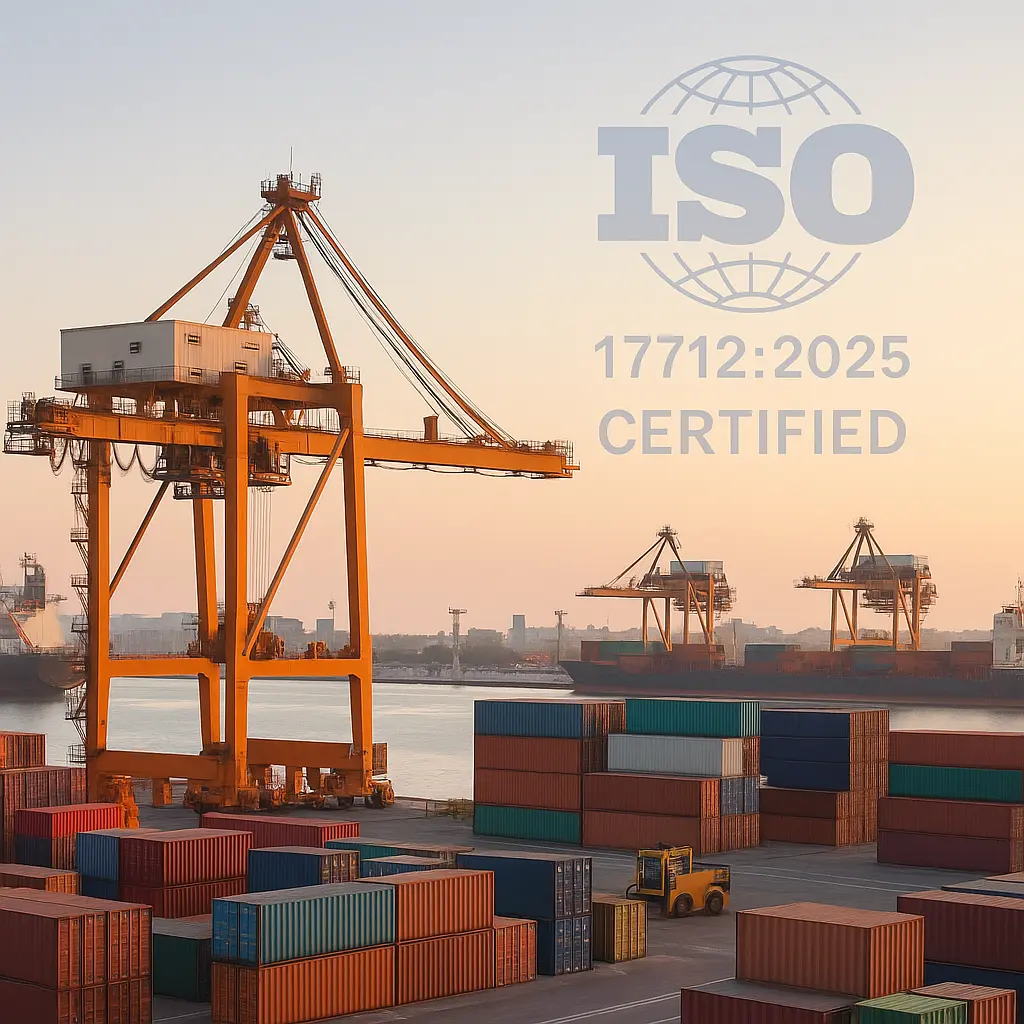When a container sits in customs longer than planned, the culprit is often something small but critical: a seal that doesn’t meet standards. The updated ISO 17712:2025 standard defines global requirements for high-security container seals. Using truly compliant seals means fewer delays, stronger security, and smoother global trade.
What ISO 17712 Really Means for Your Cargo
ISO 17712 sets the baseline for strength, traceability, and tamper-evidence in container seals.
In simple terms: any seal that claims “high-security” must pass mechanical tests, show visible evidence of tampering, and come from a manufacturer with audited processes. The right seals can make the difference between smooth clearance and stuck cargo.
5 Critical Compliance Features You Must Require
Understanding all five features helps separate real compliance from claims.
1. Built-in strength
High-security seals (often labelled “H”) must withstand cutting, prying, and impact. This isn’t optional for global shipments.
2. Visible tamper-evidence
A compliant seal must betray any attempt to open it; missing logos, broken heads, or altered numbers count.
3. Secure manufacturing
Seals must come from facilities where production, raw materials, and storage are controlled and documented.
4. Independent testing
The seal’s performance must be verified by a third-party lab, not just a manufacturer’s claim.
5. Ongoing audits
Manufacturers need regular audits of their security and production processes to maintain certification.
Avoiding Customs Roadblocks: What Smart Shippers Do
Using compliant seals isn’t enough; you must apply them correctly and document them fully.
✔ Check your supplier’s certificate
Always ask for proof that your supplier is legitimately authorised and can show test reports.
✔ Choose the right seal type
For global containers, use genuine “High Security (H)” seals, not generic or domestic ones.
✔ Train your team on the application
Make sure every seal number is recorded, the container is locked, and the seal is inspected before departure.
✔ Keep accurate documentation
Send seal serials and certificates with your shipment papers so customs can quickly verify.
✔ Maintain the audit trail
Log who applied and removed each seal to provide accountability if a query arises.
✔ Plan your seal supply ahead
Running low or sourcing last-minute often leads to the use of non-compliant seals and delays.
Why Compliant Seals Matter Beyond Just Customs
Compliance boosts security, speeds up processing, and protects your brand.
- Supply-chain security: Seals that meet ISO 17712 help prevent theft or tampering during transit.
- Faster clearance: Many customs programs (including those aligned with C‑TPAT) recognise seals that meet ISO standards, reducing inspections.
- Risk reduction: A compliant seal reduces the risk of penalties, rejected cargo, and insurance disputes.
Two-Step Checklist: Ensuring You’re Fully Covered
Step 1 – Use certified seals only
Source from trusted makers who supply documented proof of compliance.
Step 2 – Verify and store documentation
Keep test reports, audit certificates, and seal serial logs ready in digital and print formats for inspections.
Why Choose Klik e-Seal for Your Seal Solution
At Klik e-Seal, we specialise in certified, traceable, and high-security seal solutions for global logistics. Our range includes:
- Mechanical Seals
- 3-State RFID Seals
- GPS E-Locks & Seals
- Void Labels
- RFID Tags
- UHF RFID Readers
We serve every sector like supply chain, oil & gas, pharma, banking, and FMCG sectors, and more. Our track record means you get genuine ISO 17712 compliant seals backed by full documentation and service. Explore our offerings on our Products page or learn more About Us.
Secure Compliance = Smooth Trade
When you invest in truly ISO 17712 compliant seals, you’re not just buying hardware, you’re protecting your shipment, your reputation, and your bottom line. Make the right choice, apply the seal correctly,
Secure your cargo and simplify customs with Klik e-Seal’s ISO 17712 compliant seals.
Frequently Asked Questions
They include mechanical strength testing, tamper-evidence, secure manufacturing and independent certification for the seal and its maker.
C-TPAT is a U.S. supply-chain program; it recognises seals that meet ISO 17712 standards (especially “High Security” class) as compliant.
Customs recognise these seals as meeting international standards, which means fewer inspections and faster clearance.
Typically, high-security bolt seals and heavy cable seals are designed and tested to ISO 17712 criteria.
You can source them from trusted certified suppliers such as Klik e-Seal, who provide full compliance documentation.
